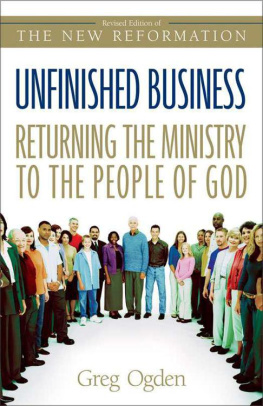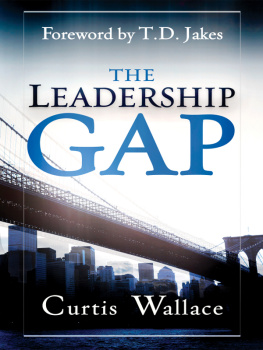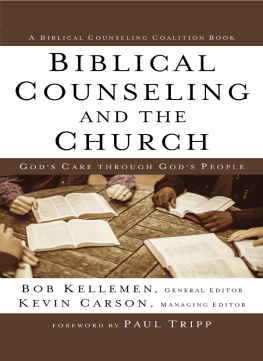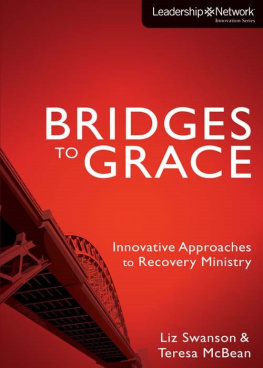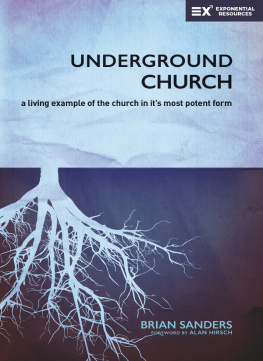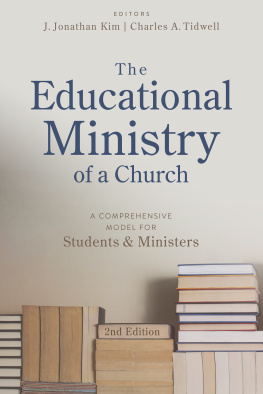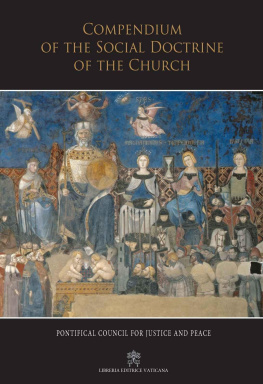Greg Ogden - Unfinished Business: Returning the Ministry to the People of God
Here you can read online Greg Ogden - Unfinished Business: Returning the Ministry to the People of God full text of the book (entire story) in english for free. Download pdf and epub, get meaning, cover and reviews about this ebook. year: 2010, publisher: Zondervan, genre: Religion. Description of the work, (preface) as well as reviews are available. Best literature library LitArk.com created for fans of good reading and offers a wide selection of genres:
Romance novel
Science fiction
Adventure
Detective
Science
History
Home and family
Prose
Art
Politics
Computer
Non-fiction
Religion
Business
Children
Humor
Choose a favorite category and find really read worthwhile books. Enjoy immersion in the world of imagination, feel the emotions of the characters or learn something new for yourself, make an fascinating discovery.
- Book:Unfinished Business: Returning the Ministry to the People of God
- Author:
- Publisher:Zondervan
- Genre:
- Year:2010
- Rating:5 / 5
- Favourites:Add to favourites
- Your mark:
- 100
- 1
- 2
- 3
- 4
- 5
Unfinished Business: Returning the Ministry to the People of God: summary, description and annotation
We offer to read an annotation, description, summary or preface (depends on what the author of the book "Unfinished Business: Returning the Ministry to the People of God" wrote himself). If you haven't found the necessary information about the book — write in the comments, we will try to find it.
Greg Ogden: author's other books
Who wrote Unfinished Business: Returning the Ministry to the People of God? Find out the surname, the name of the author of the book and a list of all author's works by series.
Unfinished Business: Returning the Ministry to the People of God — read online for free the complete book (whole text) full work
Below is the text of the book, divided by pages. System saving the place of the last page read, allows you to conveniently read the book "Unfinished Business: Returning the Ministry to the People of God" online for free, without having to search again every time where you left off. Put a bookmark, and you can go to the page where you finished reading at any time.
Font size:
Interval:
Bookmark:
This new and revised edition of Greg Ogdens groundbreaking work, The New Reformation , is one that will revitalize and energize the church as the people of God called and empowered for the ongoing ministry of Christ. I use it as a required text for my course on theology of ministry and the nature and purpose of the church and urge pastors and church leaders not only to read it but to place it in the hands of those who are being equipped and released for Christs ministry through his whole church.
Ray S. Anderson
Senior Professor of Theology and Ministry, Fuller Theological Seminary
Many searching assessments are being proposed concerning the nature and the mission of the church in our post-Christian era. This book constitutes by far the most penetrating and the most clearheaded biblically-grounded definition of the church as the people of God and of its role in the purpose of God for history.
Gilbert Bilezikian
I wish that this book could be ready by every pastor and congregation together. It would incite a gracious revolution and a deep renewal of the contemporary church.
R. Paul Stevens
Theology and Leadership, Regent College, Vancouver, BC author of The Other Six Days: Vocation, Work, and Ministry in Biblical Perspective; Seven Days of Faith; and Down-to-Earth Spirituality
Revised Edition of The New Reformation

ZONDERVAN
Unfinished Business
Copyright 1990, 2003 by Greg Ogden
All rights reserved under International and Pan-American Copyright Conventions. By payment of the required fees, you have been granted the non-exclusive, non-transferable right to access and read the text of this e-book on-screen. No part of this text may be reproduced, transmitted, downloaded, decompiled, reverse engineered, or stored in or introduced into any information storage and retrieval system, in any form or by any means, whether electronic or mechanical, now known or hereinafter invented, without the express written permission of Zondervan.
ePub Edition MARCH 2010 ISBN: 978-0-310-87411-9
Requests for information should be addressed to:
Zondervan, Grand Rapids, Michigan 49530
Library of Congress Cataloging-in-Publication Data
Odgen, Greg.
Unfinished business : returning the ministry to the people of God / Greg Odgen.Rev. ed.
p. cm.
Rev. ed. of: The new reformation. c1990.
Includes bibliographical references and indexes.
1. Priesthood, Universal. 2. ClergyOffice. 3. Lay ministry. 4. Pastoral theology. I. Odgen, Greg. New reformation. II. Title.
BT767.5 .037 2003
262.15dc21
2002156683
All Scripture quotations, unless otherwise indicated, are taken from the New Revised Standard Version , copyright 1989 by the Division of Christian Education of the National Council of the Churches of Christ in the United States of America. All rights reserved. Used by permission.
Italics in Scripture quotations are added for emphasis by the author.
To my wife, Lily, and daughter, Aimee, whom I deeply love
S INCE THE RELEASE OF The New Reformation some thirteen years ago, much has happened to confirm the prophetic message of this book that we are living in the time when we would see the promise of the Reformation fulfilled. It has been broadly observed that the first Reformation of the early 1500s placed the Bible in the hands of the people and that the Second Reformation will place the ministry in the hands of the people. I thought I was being daringly prophetic in my predictions that we were in the midst of a new Reformation. In retrospect, I see that I greatly under estimated the change that was happening in the church, which is in major part a reflection of the shift that is taking place in Western culture.
What I now see is that this shift to a people-centered ministry is part of the seismic Western drift from a Christendom to a post-Christendom model of the church. For some 1,600 years, from the reign of Constantine in the early fourth century to somewhere in the 1960s, Christianity existed at the very least in a supportive and favored place in those nations with European roots. Though the climate has been changing slowly over the last two to three hundred years, only in the last decade has it dawned on church leaders and Christian academics that we are now in a new missional environment. The church of Jesus Christ has been largely marginalized and rendered powerless. We no longer enjoy a respected and favored position in Western culture.
This relatively recent setting has caused us to ask: Who are we as the church of Christ? What is our identity? How are we to navigate these waters where the surrounding culture is now a mixture of some indifference, some supportiveness, and some hostility? In many ways this new context makes an updated version of this book all the more relevant. We live in a time of transition, in the overlap of paradigms. The Christendom paradigm viewed the pastor primarily as the chaplain or caregiver. It assumed a maintenance setting. The task of the church was to pass on the faith intact from one generation to the next in a church supported by a friendly culture.
Over the centuries, the roles of pastors in the Christendom model were finely honed. The pastoral office was highly regarded and clearly understood. The people of God knew what a pastor was supposed to be and do. The pastoral role under Christendom was to be a teacher/caregiver. To be successful as a pastor you needed to fulfill four roles fairly effectively, and the people of God would be content.
1. Teacher of doctrinal tradition There was a time in the not-too-distant past when pastors chose to be ordained into a denomination based on its distinctive theological heritage. It was the pastors responsibility to keep those distinctives alive through their teaching and preaching ministry. This was the time when denominations had a theological heritage of which they were proud and clear. Presbyterians had a Reformed tradition; Lutherans looked to Luther as their theological father figure; Methodists were Wesleyans; Baptists and other Anabaptist groups were proud that they truly saw the implication of the Reformation.
Not only did pastors do an effective job in preserving their theological and worship distinctives, but people actually identified with their tradition. So if a Lutheran family moved, the first thing they did was to look for a Lutheran church in their new community. Not just any church would do, but a Lutheran church was where they felt comfortable. They would leave their tradition only under dire circumstances. It sounds like a quaint holdover to institutional loyalty, but this was not too long ago. It was the job of the pastor to bear the weight of that tradition.
2. Caregiver Being a pastor is associated with pastoral care. Pastors are to be present in peoples lives at the times of crisisillness, grief, and quality-of-life-threatening incidents such as unemployment or divorce. Gods people have come to expect that there is no one like the pastor who can tend to their needs when life turns south. If there is an emotional contract that people have with their pastors, it is that they show up in times of crisis. Only the pastor is qualified to meet their caregiving needs. Gods people can help, but they do not match up to the pastor.
3. Public symbol of the sacred The clergy represented the institution of the church in public life. They were public symbols of the sacred. Loren Mead writes about the symbol of being an Anglican priest in England just a generation ago:
Font size:
Interval:
Bookmark:
Similar books «Unfinished Business: Returning the Ministry to the People of God»
Look at similar books to Unfinished Business: Returning the Ministry to the People of God. We have selected literature similar in name and meaning in the hope of providing readers with more options to find new, interesting, not yet read works.
Discussion, reviews of the book Unfinished Business: Returning the Ministry to the People of God and just readers' own opinions. Leave your comments, write what you think about the work, its meaning or the main characters. Specify what exactly you liked and what you didn't like, and why you think so.

